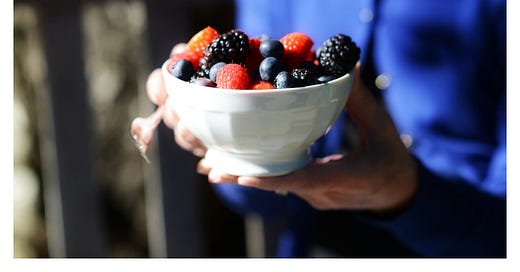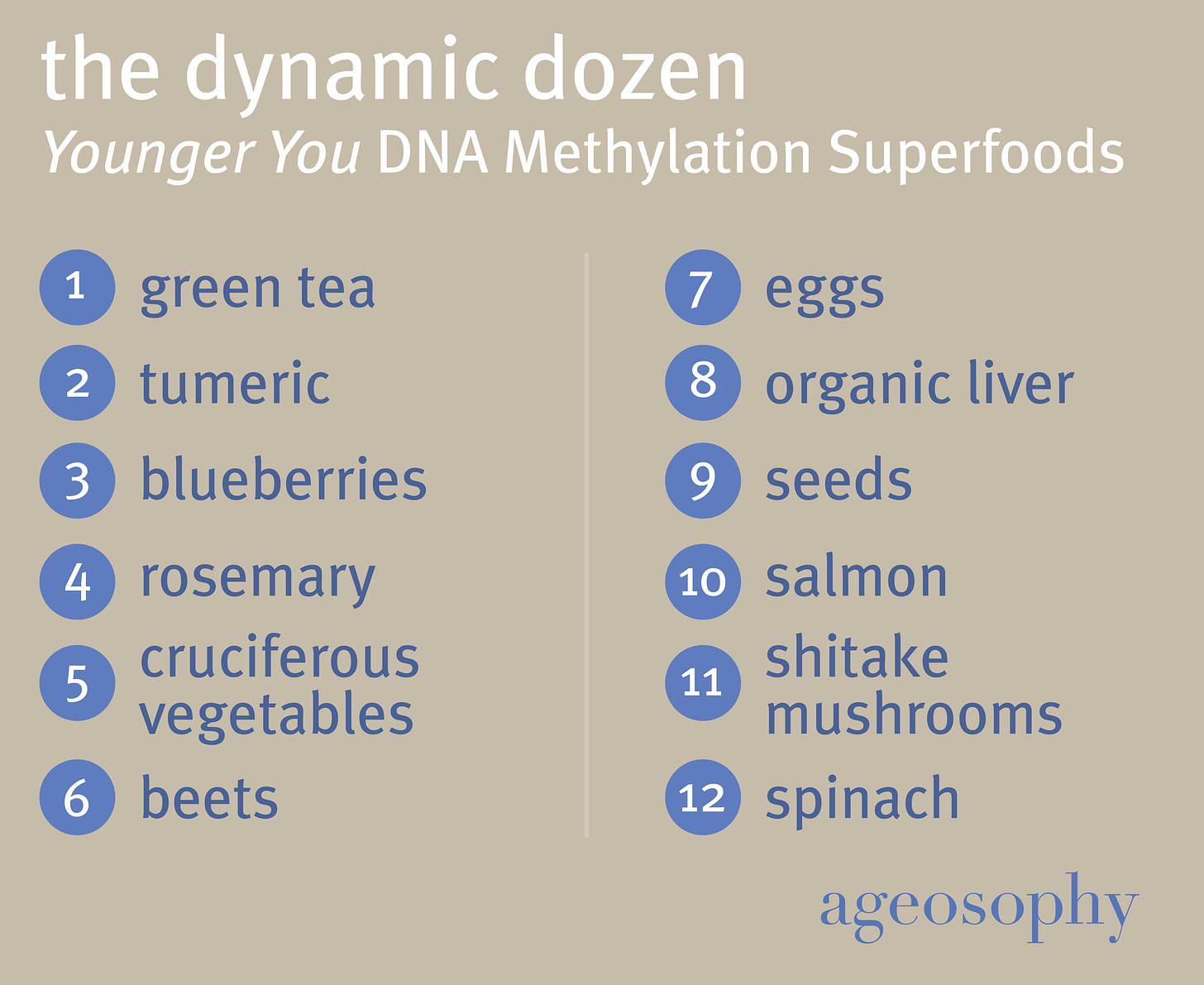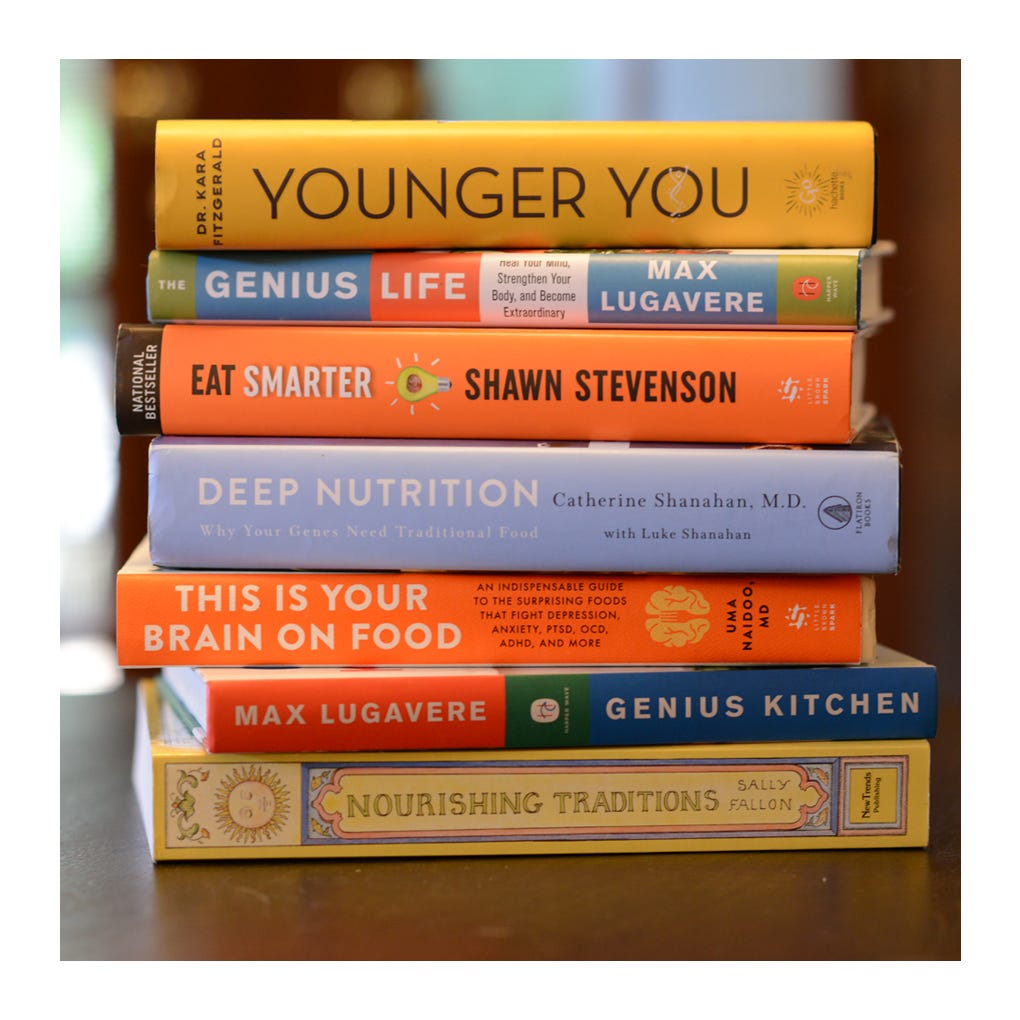Eating Epiphanies, Part 1
Looking backward to move forward, reframing your views about diet and nutrition
When I was 2 years old, we got three cats that I would know my entire childhood and into adulthood. Lady reached the impressive age of 21, Tabby—her son—lived to 19, and Ono (Lady’s first kitten, hence the name) met an untimely death by dogs at the age of 16. As I’ve gone through life and have had many pets and veterinary bills of my own, I have often thought of that trio. They were never sick. Never. The only times we went to the vet were for rabies shots and to patch them up after the occasional fight.
I have pondered their longevity for decades, as every animal I’ve had as a working adult has had some sort of ongoing malady of varying severity. Initially, I reasoned there were fewer environmental toxins in the 60s and 70s to get on their paws, and eventually digested. But then I thought about their diet. My Mom fed them—brace yourself—raw liver and kidney. Ugh. I have vivid memories of her Sunday ritual of cutting up these organs into bite-size pieces and putting them into little baggies for the week. I still shudder thinking about dolling out those raw bits in their bowls. Honestly, as a child, feeding the cats was a disgusting task. Although the raw diet fell by the wayside once my Mom got busy with her small business, at that point the cats were well into their teens and their health was pretty well set.
Epiphany 1: Evolution matters
One morning as I was swinging my kettlebell and listening to the Dr. Tyna show, she made mention of Pottenger’s Cats, a 10-year study from the 1930s in which one cohort of cats was fed a raw food diet, and the other cohort a cooked diet. In an overly simplistic nutshell, the raw food group had superior generational health, whereas the other set suffered degenerative health, from bone structure at birth to adulthood diseases. In part, it revealed the epigenetic power (the influence of behavior and environment on our genetic code) of diet on health. I stopped. Wait, what? This sounds oddly familiar. I knew a group of super healthy cats, too!
Do I think we should all be eating raw food? Heavens no, that hotly debated subject doesn’t square for me. However, there is a common thread I’ve discovered running through numerous books and discussions that Pottenger’s cats tied up in a bow: evolution. Our bodies have taken literally thousands of years to evolve. Yet within the last 100 years, we have abruptly introduced hundreds—if not thousands—of unnatural and man-made food products into our diets that our bodies are downright confused by and simply not equipped to process. The unimaginably complex and delicately balanced systems of our bodies have not evolved at the same lightning-speed rate as food industrialization, which has led to a myriad of systematic problems. Just like Pottenger’s cats.
Epiphany 2: Ancestral whole foods
In her book Deep Nutrition, Dr. Cate Shanahan utilizes a similar evolutionary hypothesis as the foundation of her Four Nutrition Pillars of the Human Diet. There is a plethora of science that fortifies the common sense strategy to go back to basics, go back to real food that “contains ordered information that can direct our cellular growth in a positive way.” Go back to eating the way our ancestors did, before crops were sprayed with carcinogens and wheat was made to withstand 100-year storms, rendering it undigestible. Go back to a balanced diet of whole foods: fruits and vegetables, fermented and sprouted foods, lean protein and meat on the bone, and (this is where she lost me as a pescatarian, but if you can, by all means, do it) organ meats…remember my long-living cat trio?
Eating an ancestral diet can:
• Improve mood
• Calm allergies
• Eliminate cravings and snack urges
• Sharpen cognition and memory
• Build stronger bones and joints
• Improve skin texture and smoothness
• Result in better immunity and overall health
When my mom first moved in with us at the age of 87, I replaced every overly processed food she was eating, with whole foods—and just that change alone made an enormous difference. She lost nearly 80 pounds and was able to eliminate all medications, including those for high blood pressure and cholesterol.
Considering I haven’t eaten meat for the past 40 years, I won’t be making the leap to organ meats or meat on the bone anytime soon (although I prepare them for my husband and son), but I have started to incorporate other Human Diet staples into my diet: bone broth several times a week, pastured eggs, and a few fermented foods. I’ve doubled down on whole foods, and I’ve made a concerted effort to eliminate processed food. If I need a particular packaged food, I look for products with the least ingredients and minimally processed. I believe it’s made a real difference in my health and longevity.
Epiphany 3: Food is functional
In my first installment of Lightbulbs&Pearls. I touched on how powerful epigenetics are to our overall health. Food plays a key role. For better or for worse, what we eat affects how our genes function, which cascades through every system of our body… from how our brain functions, to how strong our immunity is, to how well we sleep… and everything in between. As I’ve delved deeper into this subject, something really interesting happened without my even realizing it—and this in turn led to a reframing of how I view food.
I started to evaluate what I ate based on what it did for my health. Not for my weight. Not for how utterly delicious it was. But what it was going to do to my health and body. This shift in mindset from diets to nutrition has had a really surprising impact. I have found my cravings for the occasional splurges such as potato chips, fries, and onion rings have all but disappeared.
There could be a couple of reasons for this. First, processed food is engineered to be crave-able (and literally addicting), so the less you consume, the less you crave. Eliminate processed food from your diet and your yearning for Triscuits will dramatically decline. Second—but equally important—what the mind wills, the body follows. As I’ve gotten older, my health has become much more of a focus, because I know that the dreams I’d like to realize will depend on it. The shift in thinking from “will this make me fat?” to “what will this do to my genes?” has done wonders.
I’ve created my own repertoire of functional foods (which is foundational for aging well) that I like and fits my lifestyle from the aforementioned Deep Nutrition, as well as Eat Smarter by Shawn Stevenson, Genius Life by Max Lugavere and This is Your Brain on Food by Dr. Uma Naidoo. Additionally, I do my level best to include most of Dr. Kara Fitgeragld's “Dynamic Dozen DNA methylation superfoods” from her book Younger You in the chart below (although #8 is definitely not on my list and I’m not a fan of beets, so that’s in supplement form).
Epiphany 4: Your body rewards you
For years, every Thursday was a traditional splurge day for me and my husband. A very long-standing tradition—at least 25 years. We would load up on fries, onion rings, sodas, burgers, and sandwiches. We nicknamed our ritual “grease” based on what was visible on the bags. But slowly, I started weaning myself off of it. First I dropped my beloved root beer. Then the mediocre fried fish sandwich. Before I was even aware of it, the fries and onion rings that I had looked forward to every week weren’t shouting my name. My once cherished meal had lost its appeal. This was a sea change.
Don’t get me wrong, I still allow myself less toxic weekly treats (Saturday night from scratch pizza) and this Christmas I was a hook-line-and-sinker sucker for the ubiquitous holiday Sees’ Candies under the tree. I indulged in a butter-and-sour cream-drenched baked potato and homemade cheesecake for Christmas dinner. But this year, I had unexpected restraint…I was able not to overindulge…I could actually stop at one Sees’ candy for the day.
As your body detoxifies, you will feel better. And as you feel better, you will want to feel even better. Your immunity will improve. You may sleep more soundly. You won’t drag through the afternoon. The bloat will subside. Junk foods start to lose their appeal and what you craved at one time may even make you feel a bit yucky. Listen to the ancestral wisdom of your body… and you too may find yourself with a cat’s proverbial nine lives.
Stay tuned for Eating Epiphanies, Part 2!













Well we all know cats are revelatory creatures, so why not Pottenger's? :D
This was a fascinating read, packed with good advice. I've never thought of "food industrialization" as such, but it does urge me to start re-evaluating my notions of what actually constitutes "healthy eating." Radical changes ahead? Looking forward to the next installment!